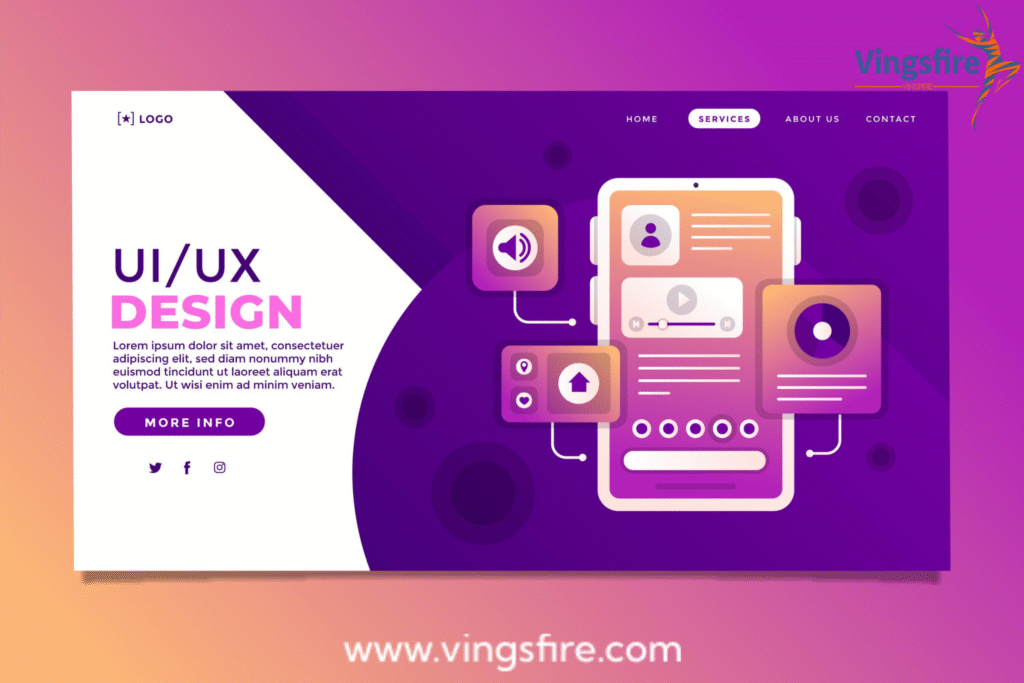
In today’s competitive design landscape, your UI/UX portfolio is more than just a collection of work samples—it’s your professional signature, your career accelerator, and your most persuasive business card. With 75% of hiring managers prioritizing portfolio quality over resumes, crafting an exceptional UI/UX portfolio has become the golden ticket to landing dream jobs and premium clients. At Vingsfire, we’ve reviewed thousands of portfolios and helped designers transform their presentations into compelling career tools.
This comprehensive 2000-word guide will reveal:
- What makes a UI/UX portfolio stand out in 2025
- 7 essential components every portfolio must include
- Industry-specific portfolio strategies that get results
- Common UI/UX portfolio mistakes that sabotage opportunities
- Cutting-edge presentation techniques top designers use
- How to showcase problem-solving beyond aesthetics
- Where to host your portfolio for maximum visibility
What is a UI/UX Portfolio? (The 2025 Definition)
A UI/UX portfolio is a curated showcase of a designer’s skills, process, and thinking demonstrated through real projects. Unlike traditional creative portfolios, modern UI/UX portfolios emphasize:
✔ Problem-solving over pretty pixels
✔ Process documentation beyond final screens
✔ Measurable outcomes rather than subjective praise
✔ Case study depth instead of project breadth
✔ Personal brand narrative alongside work samples
UI/UX Portfolio vs. Traditional Design Portfolio
| Aspect | UI/UX Portfolio | Traditional Design Portfolio |
|---|---|---|
| Focus | Process and impact | Final visuals |
| Structure | Case study format | Gallery style |
| Metrics | Business outcomes | Aesthetic quality |
| Content | Research to results | Finished pieces |
| Audience | Product teams | Creative directors |
7 Essential Components of a Winning UI/UX Portfolio
1. Strategic Project Selection
- 4-6 high-impact projects (quality over quantity)
- Variety demonstrating range (mobile, web, SaaS, etc.)
- Real-world projects preferred (even if conceptual)
2. Compelling Case Studies
- Clear problem statements
- Your specific role and contributions
- Research and discovery insights
- Iteration and evolution
- Measurable results
3. Process Documentation
- User research methods
- Journey maps and flows
- Wireframes and prototypes
- Usability testing results
4. Visual Storytelling
- High-quality project visuals
- Before/after comparisons
- Micro-interaction demonstrations
- Responsive design examples
5. Accessibility Considerations
- WCAG compliance notes
- Inclusive design decisions
- Accessibility testing results
6. Personal Brand Touch
- Unique “About” section
- Design philosophy statement
- Professional personality
7. Seamless Navigation
- Intuitive information architecture
- Fast loading times
- Mobile-optimized experience
Industry-Specific UI/UX Portfolio Strategies
For Job Seekers
- Tailor projects to target roles/industries
- Highlight collaboration skills
- Include passion projects that demonstrate initiative
For Freelancers
- Showcase client diversity
- Emphasize business impact
- Include testimonials
For Agencies (Like Vingsfire)
- Demonstrate team capabilities
- Show full project lifecycles
- Highlight measurable client results
5 Deadly UI/UX Portfolio Mistakes
⚠ Only Showing Final Screens – Fails to demonstrate thinking
⚠ Overdesigning the Portfolio Itself – Distracts from content
⚠ Ignoring Mobile Optimization – 60% of recruiters view on mobile
⚠ Lacking Context – Doesn’t explain challenges/solutions
⚠ Being Too Wordy – Keep case studies scannable
Emerging UI/UX Portfolio Trends for 2025
🔮 Interactive Case Studies – Let viewers “play” with process
🔮 AI-Assisted Presentations – Dynamic content tailoring
🔮 Video Walkthroughs – 30-60 second project summaries
🔮 Live Data Dashboards – Showing real product impact
🔮 3D Portfolio Environments – Immersive project exploration
Why Your Portfolio Matters to Agencies Like Vingsfire
When we evaluate designers at Vingsfire, we look for portfolios that show:
- Strategic Thinking – How you solve problems
- Process Rigor – Research to iteration
- Visual Craft – Attention to detail
- Business Impact – Results beyond aesthetics
Conclusion: Your Portfolio as a Growth Engine
An exceptional UI/UX portfolio does more than display work—it tells your professional story, demonstrates your value, and opens doors to exciting opportunities. In an industry where visual communication is currency, your portfolio is quite literally your net worth.
Ready to build or upgrade your portfolio? Vingsfire offers portfolio reviews and design career coaching.
